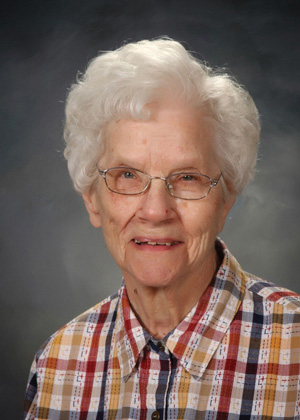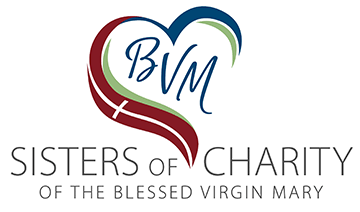Mary Frances Shafer, BVM (Francis Edward)

Mary Frances Shafer, BVM (Francis Edward), 90, died Tuesday, Jan. 3, 2017, at the Caritas Center, Mount Carmel, in Dubuque, Iowa.
Visitation will be from 9–11 a.m. on Monday, Jan. 9, 2017, in the Marian Hall Chapel, followed by a prayer service at 11 a.m. Funeral liturgy will be at 1:30 p.m. Burial is in the Mount Carmel cemetery.
Mary Frances served as president of the BVM congregation from 1980–84 and as vice president from 1976–80. She was director of admissions and Scholasticate director for the congregation and served as liturgist at Mount Carmel.
“Mary Frances Shafer’s leadership was marked by a commitment to the renewal of religious life, a dedication to the education of lay ministers, and a quest for justice and peace,” says Helen Maher Garvey, BVM (Robert Joseph). “She pursued this course with gentleness, courage and kindness.”
She taught theology at Clarke University and eighth grade at Holy Family ES in Mason City. She also taught elementary school and was principal in Pontiac and Chicago, Ill.; St. Louis, Mo.; and Wichita, Kan. She served as administrative assistant to superintendent of schools, Kansas City; director of lay ministry for the Diocese of Great Falls, Mont.; and as personnel director for the Diocese of Joliet, Ill.
She was born in Kansas City, Mo., on July 15, 1926, daughter of Frank Edward and Mary M. Aigner Shafer. She entered the BVM congregation on Sept. 8, 1943. She made her first profession of vows on March 19, 1946, and her final profession on Aug. 15, 1951.
She was preceded in death by her parents, four brothers and five sisters. She is survived by nieces and nephews; and the Sisters of Charity of the Blessed Virgin Mary, with whom she shared life for 73 years.
Mary Frances Shafer, BVM (Frances Edward)
President, Sisters of Charity, BVM, 1980–84
Eulogy by Helen Maher Garvey, BVM (Robert Joseph)
Mount Carmel, Dubuque, Iowa
Jan. 9, 2016
On behalf of the BVM congregation, I welcome BVMs watching on videostream and on our local channel. We thank hospice and the nurses, aides and activity personnel on the fourth floor for their devoted, sensitive care of Mary Frances and as she lived out her final years.
We appreciate the special fidelity to Mary Frances of Msgr. Barta, Msgr. Toale, and BVMs Deanna Carr (Bernita), Mary Ellen Caldwell (Eugenio), Margaret Mear (Jacoba) and Bernadette McManigal (Lucinus).
Mary Frances Shafer was born July 15, 1926, youngest of the 10 children of Frank Edward and Anna Maria (“Mary”) Aigner Shafer. She was born in Kansas City, Mo., at a time when the United States was on the brink of the Depression. Despite the times, Mary Frances admitted enjoying many childhood “perks” in the Shafer household and her allowance was frequently augmented by doting sisters and brothers!
Following in the steps of older sisters Ann Mary and Rose, Mary Frances made up her mind to enter the BVM ommunity she so admired. She submitted her application, including the results of her physical, and was “devastated” when Mother Mary Josita refused to admit her for reasons of health. With typical determination, and with support from family and friends, she sought a second opinion and her new doctor helpfully agreed that she would thrive in the “regulated life” of a community. (And thrive she did, but whether the life was to be all that “regulated” remained to be seen!)
Who was Mary Frances Shafer?
I did not know her very well when I came to Dubuque for an orientation after our election as vice presidents in 1976. We were driving together to some event and Mary Frances started singing; she continued singing; she found new tunes; she continued singing. I did not know the songs. I did not know the tunes. I did not know anyone who sang with such enthusiasm. “Well,” I thought, “It is going to be a long four years.” Little did I know that these songs echoed the soul of a holy woman who would bring me into the arc of her own generous, lyrical spirit.
We could describe her by the geography of her life—Missouri, Kansas, Illinois, Iowa, Massachusetts, Montana. Her ministries are a testimony to her openness of spirit, a willingness to respond to the challenge of our Constitutions “to live in any part of the world where there is promise of furthering the mission of Jesus.”
We could describe her by the variety of her ministries—elementary school teacher, professor of theology, director of formation, president of the BVM congregation, diocesan director of lay ministry, diocesan director of personnel, director of liturgy. We can imagine her as a young, newly professed sister teaching arithmetic in the seventh grade at Presentation Parish School on the west side of Chicago. We can imagine her as the creator of the lay ministry program, traveling icy roads across the length and breadth of eastern Montana, teaching over 400 parishioners from 1986–1995. We can imagine her here in Dubuque as a retired working resident, making each liturgy a special occasion.
We could describe her by the depths of her scholarship. That scholarship characterized her presentations at Clarke University, at the lay ministry program in eastern Montana, and as president of the BVM congregation. Her work stands the test of time, enriching us all with keen analysis of the spirit of Vatican II. Such thoroughness and care compelled her to edit letters to the congregation, or any document, with a rigor that sent its authors back to the drawing board time and again. More than once Eileen McGovern, BVM and I begged for grammatical mercy!
We could describe her by her humanity. She loved being the youngest of 10 children. She enjoyed being a little spoiled as a child. On the other hand, she found it hard being the last living member of her family. She could drink coke, eat candy, and party with the best of us. She could make fudge for a lonely student on sabbatical. She could say about her ministry in formation, “I found it ‘challenging,’ ‘difficult’ and ultimately ‘disappointing.’” She could engage any small child anywhere with an intuitive understanding.
We could describe her by her spirituality. Mary Frances Shafer’s spirituality was expressed not only in the theology she taught so well and in the prayer that she breathed so faithfully, but in the suffering she bore so graciously. She was, as the poet says, “still under the weathers of God’s will, and had no hurt surprise when morning’s ruddy promise died.”
We could describe her as a deep responder to Vatican II, a prophetic witness to religious life. She expressed the conviction that:
We are witnessing and participating in an evolution of religious life that is as radical and far-reaching as the evolution from the hermitage to the cloister, or from the monastic to the apostolic life. Together, let us beg God to make us all “fit instruments in His (her) hands.”
(Women of Jubilee, Address to the BVM Congregation delivered on the 150th Jubilee of the BVM Congregation, 1980.)
But she was so much more than these separate categories. Mary Frances Shafer was one of the cloud of witnesses. She was and is a holy woman, one who continuously sought the love of Christ. Mary Frances had her priorities straight from the beginning. Writing on her application to the congregation in May, 1943, she declared: “I wish to be a sister in order to gain a greater knowledge and love of Christ and to help others to be closer to Him.”
As Mary Frances grew into her vocation, and as the call of Vatican II intensified, that desire to love Christ matured into a love that seeks justice and peace. On the occasion of the dedication of the Mary Frances Shafer Library in 1980 she declared:
To the extent that we remain true to the reality of the Lord’s call, we will spend our future promoting gospel values in a world which rejects them as naive and impractical. Within a society which treasures material prosperity, we will live simply. In the face of apathy and hypocrisy, we will speak the truth which Jesus has promised will set all free. Through personal and congregational witness, we will share a solid, vibrant faith with people haunted by doubt. Whatever the shape of our ministry, we will work to eradicate the roots of injustice within ourselves, our congregation, the church and the world.
She lived this commitment to justice as she marched for the nuclear freeze, spoke out publicly for peace, and acted daily for the poor. Mary Frances Shafer’s leadership was marked by a quest for justice and peace. She pursued this course with gentleness, courage and devotion. In all of her experience, she understood the journey to death and the meaning of it all. At the time of her sister Erma’s death, Mary Frances wrote in a letter to BVM Mary McCauley:
Erma’s death brought release for her from a debilitating and crueldisease(Alzheimer’s). Italsobrought thepain ofpartingoncemoreto Helen, Genevieve andme. We are the three left of the eight children who survived infancy. It is wonderful to be the youngest while growing up. To be the youngest at this point in life is a different story. However,God is very near and, I’m sure, is using all my experiences to draw me closer every day. One day my death will be natural to me and simply be the final and decisive choice of God.
(Excerpt from a letter of Mary Frances Shafer to Mary McCauley on the occasion of her sister Erma’s death. September 1993)
Nonetheless, Mary Frances, ever sensitive to the call of God, not only to herself, but also to the BVM congregation, spoke often of the future. Back in 1980, when she delivered the 150th Jubilee Address to the BVM congregation, Mary Frances extolled Mary Frances Clarke’s steady consideration of the future. Mary Frances Shafer and Mary Frances Clarke might well be speaking to us today:
Given our identity and our values . . . I can’t imagine that she (Mary Frances Clarke) had an exalted vision of some aesthetically-pleasing version of faith life in the United States. I think, rather, that in her practical Irish wisdom, she made a solid assessment of the facts at hand, evaluated the situation of God’s people in our country, and was prompted to make an intelligent response that sprang from closeness to God and sensitivity to the urges of the Spirit. In so doing she established a pattern for us to follow and gave an example of genuine trust that God would provide for those who use their human gifts and talents to determine a course of action aimed at bringing the kingdom of God closer to complete fulfillment.
This congregational future promised some fearsome losses for Mary Frances personally. Struggle and humiliation lay ahead, a time of frustration and patient endurance, a time of grace and light. But these times have rarely ever been without a song. Even while attending the recent Christmas party, she sang “White Christmas” one last time with perfect pitch! Song and poetry marked the life and the final days of Mary Frances Shafer—Christian, religious, scholar, minister, leader, friend, wounded one, holy woman.
And though she walks in rags and tatters
Her face is to a sunset turned.
And what she has no longer matters
Before this light that she has learned.
—Jessica Powers, OCD
